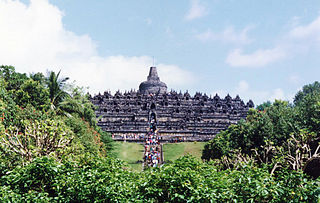
The Sasak people live mainly on the island of Lombok, Indonesia, numbering around 3.6 million. They are related to the Balinese in language and ancestry, although the Sasak are predominantly Muslim while the Balinese are predominantly Hindu. Sasak people who practice pre-Islamic beliefs are also known as Sasak Boda in reference to the name of the Sasak people's original religion, Bodha.
Sultan Anyakrakusuma is known as Sultan Agung was the third Sultan of Mataram in Central Java ruling from 1613 to 1645. He was a skilled soldier who conquered neighbouring states and expanded and consolidated his kingdom to its greatest territorial and military power.

The Kingdom of Pajang or Sultanate of Pajang was a short-lived Muslim state in Java. It was established by Hadiwijaya or Jaka Tingkir, Lord of Boyolali, after a civil war and was a successor to Sultanate of Demak. Hadiwijaya claimed to be a descendant of Brawijaya V, the last king of the Majapahit empire, and Trenggana, the sultan of Demak.

The Wali Songo are revered saints of Islam in Indonesia, especially on the island of Java, because of their historic role in the spread of Islam in Indonesia. The word wali is Arabic for "trusted one" or "friend of God", while the word sanga is Javanese for the number nine.
Shi Daniang, known as the Great Lady of Gresik or Nyai Gede Pinatih, was a Chinese-Muslim noblewoman from Palembang during the Majapahit era. She was the daughter of chieftain xuanweishi Shi Jinqing of Palembang. After her father died, Admiral Zheng He of Ming China decided to make her brother the new chieftain of Palembang, so she left Palembang and went to Gresik in east Java to preach her religion to the natives.
Malik Ibrahim, also known as Sunan Gresik or Kakek Bantal, was the first of the Wali Songo, the nine men generally thought to have introduced Islam to Java.
Sunan Kalijaga was one of the "nine saints" of Javanese Islam. The "Kalijaga" title was derived from an orchard known as "Kalijaga" in Cirebon. Other accounts suggest the name derives from his hobby of submerging himself in Kali. Others note that the name Kalijaga derived its nature from the Arabic notion of qadli dzaqa which means "holy leader" in the sultanate.

Sunan Giri, Muhammad Ainul Yakin is considered one of the Wali Sanga of Indonesia.

The Demak Sultanate was a Javanese Muslim state located on Java's north coast in Indonesia, at the site of the present-day city of Demak. A port fief to the Hindu-Buddhist Majapahit kingdom thought to have been founded in the last quarter of the 15th century, it was influenced by Islam brought by Muslim traders from China, Gujarat, Arabia and also Islamic kingdoms in the region, such as Samudra Pasai, Malacca and Bani (Muslim) Champa. The sultanate was the first Muslim state in Java, and once dominated most of the northern coast of Java and southern Sumatra.
Sunan Bonang was one of the Wali Songo, along with his father Sunan Ampel and his brother Sunan Drajat.
Sunan Ampel was one of the Javanese nine revered saints Wali Songo, credited for the spread of Islam in Java. According to local history around Demak the mosque of Demak Masjid Agung Demak was built by Sunan Ampel in 1479 CE, but other sources credited the construction of the mosque to Sunan Kalijaga.
Serat Centhini is a twelve volume compilation of Javanese tales and teachings, written in verse and published in 1814. The work was commissioned, directed and partially written by Crown Prince Mangkunegoro, later enthroned as Pakubuwono V of Surakarta, with contributions from three court poets from different palaces.
Raden Patah, also known as Jin Bun was the first sultan of the Demak Sultanate. Ascending to the throne in 1475, his remained a vassal of the Majapahit Empire until 1478. Raden Patah took the title Panembahan Jimbun after legitimizing the Sultanate of Demak as the successor state to the Majapahit Empire, with Wali Sanga appointing him as the Sultan of Demak.
The Duchy of Surabaya was a Javanese principality centered in Surabaya, on the northeastern coast of Java, that existed as an independent polity from c. 1546 to 1625. It became independent following the disintegration of the Demak Sultanate, and by the beginning of the 17th century had become the leading power in east Java and the most important port on Java's northeastern coast. Subsequently, it entered into decades of conflict with the Mataram Sultanate that ended in the victory of Mataram and the fall of Surabaya in 1625.
Pangeran Pekik was a Javanese prince, and son of the last Duke of Surabaya, Jayalengkara. After the Mataram conquest of Surabaya he was forced to live in Mataram court. He was executed in 1659 under the orders of Mataram's King Amangkurat I, who suspected him of conspiracy.

Islam is the most common religion in the Indonesian province of East Java, embraced by 96.7% of the whole population. Throughout its history, East Java has been considered one of the heartlands of Islam in Indonesia; the province experienced one of the earliest proliferations of Islam, as well as the establishment of the largest Islamic mass organization in Indonesia, Nahdlatul Ulama.
Panembahan Senapati, formally styled Panembahan Senapati ing Ngalaga Sayyidin Panatagama, was the founder of the Mataram Sultanate.

Giri Kedaton was an Islamic kedatuan located in Gresik, East Java and existed in the 15th to 17th centuries, until Giri was conquered by the Mataram Sultanate in 1636.
Raden Kusen, also known as Kin San was the Duke of Terung and one of the last commanders of the Majapahit Imperial Army. His father was the Duke of Palembang, Arya Damar while his mother was Siu Ban Ci, the former concubine of Majapahit Emperor. He was a half-brother of Raden Patah, the founder of the Demak Sultanate. He supposedly was to succeed his father at the Duchy of Palembang, as the Duke of Palembang, but he along with his brother moved to Java island. His descendants, the sultans of Palembang from the 17th century until 19th century were his rightful successors.





